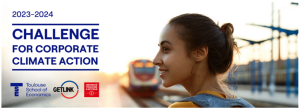Getlink reveals the Corporate Climate Action Challenge Jury co-created with Toulouse School of Economics
- Low Carbon
In 2022, the Getlink Group and Toulouse School of Economics (TSE) created the “Initiative for Effective Corporate Climate Action” with the objective of:
- advancing research on companies’ impact on climate.
- sharing experiences.
- measuring the costs of decarbonisation efforts and proposing feasible solutions.
In all its actions Getlink approaches the ecological transition from a dual perspective: economic – the ability to create value and prosper – and climate, to determine the best levers for achieving the objectives of the Paris Agreement, then communicates its progress with as many companies as possible. thereby advancing corporate climate action.
As part of this collaboration, students from TSE, Toulouse Schools and Universities have been invited to participate in the Challenge for Corporate Climate Action, for which they worked on a decarbonisation approach applicable to a company, evaluating both its impact and the technical and financial conditions for its feasibility.

For this first edition, the Jury that will audition the selected teams, is made up of 8 members, each bringing their own expertise and perspective:
- Corinne Bach, Independent Director, Board of Directors Getlink
- Ulrich Hege, Finance Professor at TSE
- Magali Joessel, Director of the Industrial Investment Department Bpifrance
- Alexandra Milleret, Deputy Editor-in-Chief Wansquare
- Yann Leriche, CEO Getlink
- Fernando Olmedo, Investor Outreach Manager FAIRR – TSE graduate
- Géraldine Périchon, CFO Getlink
- Silvia Rossetto, Researcher and Finance Professor at TSE
The jury will evaluate each project based on its impact on climate change, its economic impact (for the business sector, for society…), its degree of innovation and originality, and finally its feasibility.
The awards ceremony, which will be attended by Minister Christophe Béchu, will bring together the two finalist teams on 24 April at the Ministry of Ecological Transition and Territorial Cohesion.



